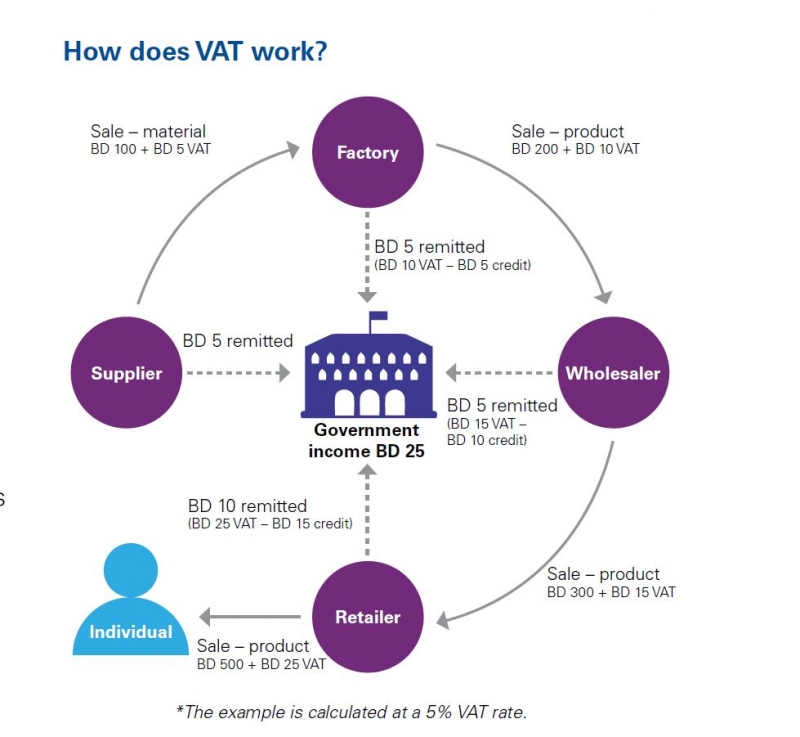VAT impact on financial services sector
The Financial Sector is the second largest contributor to Bahrain’s GDP, estimated at around 16%, second only to the oil and gas sector. As of 2016, the estimated value of the Banking sector assets was close to $193 billion. The Financial Sector being crucial to Bahrain’s economy, it becomes pertinent to assess the impact VAT will have on the industry. The GCC VAT Agreement (‘the Agreement’) prescribes a VAT exempt treatment of financial services performed by banks and financial institutions in the GCC region. Based on the Agreement, the Kingdom of Saudi Arabia (KSA) and United Arab Emirates (UAE) VAT legislations have exempted the financial services subject to certain exceptions. As per the VAT laws of the 2 countries (KSA and UAE), financial services are subject to VAT where the consideration in respect of a service is by way of an explicit fee, commission or commercial discount. Thus, only those cases where consideration is received based on an implicit margin or spread or interest, financial services will be exempt from VAT. An illustrative list outlining the VAT treatment in KSA and UAE has been provided hereinbelow: Impact on the Financial sector:
• One of the clear impact is that the financial services sector will have a mixed bag of taxable and exempted products (revenue streams). So, the first step is to identify the taxable products out of the total list of products / services provided by the Bank / financial institutions.
• As regards the exempted products, at first glance this may seem beneficial for the sector, as no VAT is applicable when services are provided to the customer. However, on the flip side since suppliers of exempt services cannot avail the benefit of claiming an input tax deduction, whatever VAT is paid by the banks / financial institutions on services or goods purchased for the exempted business, will become a cost for the companies. Further, since financial institutions will be engaged in both taxable and exempted services, the companies will have to come up with a method to apportion the input tax deduction in relation to their taxable and non-taxable activities. Such processes can be highly cumbersome depending on the size/scale of operations which a financial institution undertakes. Accordingly, it is advisable that appropriate measures to account for the same be made prior to the introduction of VAT.
• One of a very interesting point is whether Bahrain will follow what KSA or UAE has done as regards the VAT treatment of specified financial services (exempt status). While the GCC agreement prescribes the exempt treatment, it also leaves the discretion in the hand of each country to decide the taxability of such services in their own country. Bahrain, conceptually, can provide a better treatment (such as “zero rated supplies”) for the financial services. This will make it a more attractive destination for Financial sector organisations to base their operations in Bahrain.
• VAT is a transaction tax and is based on billings done to the customer. However, in the beginning there will be revenues billed and / or collected in pre-VAT period but the service period extending beyond the VAT implementation date. For instance, a credit card provider charges an annual fee to its customer for a one-year period, i.e. October 2018 to September 2019. Assuming VAT is introduced from 1st January 2019; the service provider will have to ascertain the taxable amount from Jan’19 to Sep’19, and accordingly pay VAT on the same. Similar for motor or general insurance products. One challenge will be how will these companies able to collect the VAT from customer for the post VAT period?
• The other interesting aspect is taxability of Islamic products. The law states that its taxability will be based on the effective result these products seek to achieve when compare with the conventional banking products. Hence each product needs to be examined and its taxability determined. • What will happen in case of Hire purchase or Murabahah products. It is likely be exempted due to implicit margin or interest. If yes, the how will the VAT charged by the vendor from whom the equipment/ machine / car is bought – will it be cost or can be passed on the final customer who is effectively the buyer?
• A major issue for the financial sector will be the invoicing requirement for all fees/commission/charges which are subject to a standard rate of VAT (i.e. 5%). For instance, currently no separate invoices are raised for late fees on credit cards/fees for electronic money transfer/ATM withdrawal fees, etc. All these services will now need proper documentation for VAT purposes. Further, when such fees/commission/charges are levied on B2B transactions, raising of invoice to the recipient becomes important, since the VAT paid on the fees/commission/charge will be available as input tax deduction to the recipient. Therefore, requisite changes would have to be made in the IT-systems/ERP of financial institutions for invoicing of such fees/commission/ charges. The abovementioned issues clearly showcase the mammoth task which financial institutions have ahead of them as the date for implementation of VAT nears. In such circumstances, the industry must ensure that their IT-infrastructure is ready for facing the challenges which will be posed by the coming VAT regime. In addition, sufficient representations before the Ministry of Finance must be made by the industry to bring out the practical difficulties which will be faced during the implementation of VAT, and accordingly seek appropriate remedies for the same. This would be in the mutual benefit of both the Government and the taxpayers, as the financial sector plays such a vital role in the country’s economy.
Related Posts

